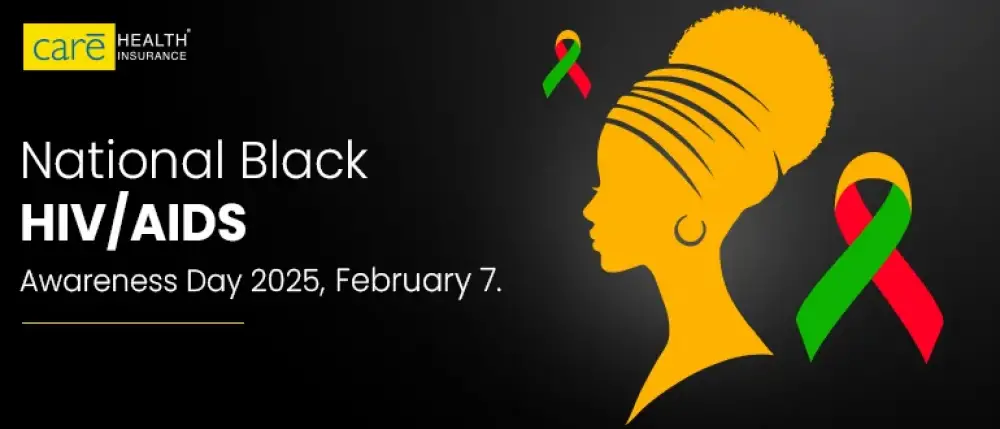Subscribe to get weekly insights
Always stay up to date with our newest articles sent direct to your inbox
Published on 5 Feb, 2025
Updated on 6 Feb, 2025
310 Views
3 min Read

Written by Mudit Handa
Reviewed by Rashmi Rai
1Like
As a step ahead towards humanity and universal well-being, National Black HIV/AIDS Awareness Day (NBHAAD) is observed annually on February 7th to create awareness about HIV/AIDS in the Black African community worldwide. This day reminds us all that HIV impacts all humankind, regardless of caste, creed and colour. The National Black HIV/AIDS Awareness Day urges community support and open conversations about HIV prevention, testing, and treatment among the black African population worldwide.
The National Center for HIV/AIDS, Viral Hepatitis, Sexually Transmitted Diseases and Tuberculosis Prevention (NCHHSTP), a US-based Division of HIV/AIDS Prevention, began the initiative to observe the National Black HIV/AIDS Awareness Day in 1999.
This article will guide you in detail about the significance of the National Black HIV/AIDS Awareness Day.
NBHAAD is crucial due to the disproportionate impact of HIV/AIDS on the Black community. Despite advancements in prevention and treatment, Black individuals in the United States continue to be diagnosed with HIV at higher rates compared to other racial and ethnic groups. This day reminds us of the worldwide fight against HIV/AIDS and the need for targeted efforts to overcome the social problems faced by the Black community.
NBHAAD continues to be an essential day for raising awareness about HIV/AIDS in the Black community and for promoting testing, prevention, and treatment of HIV/ AIDS.
National Black HIV/AIDS Awareness Day was first observed in 1999. The day was chosen to coincide with Black History Month, highlighting the importance of addressing health disparities within the Black community.
Several organisations, including the Centre for Disease Control and Prevention (CDC) and the National Black Leadership Commission on AIDS (NBLCA), spearheaded the initiative.
The social message behind the National Black HIV/AIDS Awareness Day 2025 has always been awareness towards the prevention of HIV/AIDS. Accordingly, we should do the needful:
Remember, we're all in this together. By working together, we can create a future free from HIV/AIDS.
In the words of the great angel of humanity, Michael Jackson, “Heal the world, make it a better place… for you, and for me, and the entire human race!”.
The theme for National Black HIV/AIDS Awareness Day 2025 is "Engage, Educate, Empower: Uniting to End HIV/AIDS in Black Communities".
The theme for the National Black HIV/AIDS Awareness Day 2025 focuses on proactive engagement and addressing the disproportionate impact of HIV within Black communities.
HIV/AIDS symptoms can vary according to the stage of the infection.
Early symptoms of HIV often resemble a flu-like illness and may include the following–
However, the immune system deteriorates as the infection progresses, making the patient more vulnerable to opportunistic infections.
While there is no permanent cure for HIV/AIDS, antiretroviral therapy (ART) is the primary treatment used to combat the symptoms of the infection and prevent its progression.
ART involves taking a combination of medications that work towards the following medical results:
This is how you can tackle the health crisis caused by HIV/AIDS infection.
National Black HIV/AIDS Awareness Day sheds light on a critical public health issue. To end the stigma of HIV/AIDS in the black community and create a healthier future, we can come together and increase awareness and promote testing and treatment for the ailments.
Let us all commit to engaging, educating, and empowering ourselves and others to combat this disease and support those affected by it.
Pro tip: Regular health checkups from your health insurance plan can help you monitor your immunological health and prevent the potential risks of getting infected.
Disclaimer: The information in this blog is for reference purposes only. The National Black HIV/AIDS Awareness Day is prevalently celebrated in the US among African American countries. For details on coverage of Annual Health Checkups, refer to your health insurance policy documents.
शुगर कंट्रोल कैसे करे? जानें, डायबिटीज में क्या खाना चाहिए Care Health Insurance in Health & Wellness
Thyroid : मामूली नहीं हैं महिलाओं में थायराइड होना, जानें इसके लक्षण और घरेलू उपचार Care Health Insurance in Diseases
हाई ब्लड प्रेशर को तुरंत कंट्रोल कैसे करें? देखें इसके उपाय Care Health Insurance in Diseases
प्लेटलेट्स की कमी के लक्षण, कारण और इलाज क्या है Care Health Insurance in Diseases
World Chagas Disease Day: Understanding Global Health Impact of Kissing Bugs Care Health Insurance in Awareness Days
World Parkinson’s Day: Raising Hope for the Elderly Care Health Insurance in Awareness Days
World Bipolar Day 2025: Understanding Bipolar Disorder and Breaking Stigma Care Health Insurance in Health Insurance Articles
ट्यूबरक्लोसिस (टीबी) के लक्षण, कारण और इलाज Care Health Insurance in Awareness Days